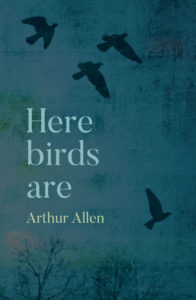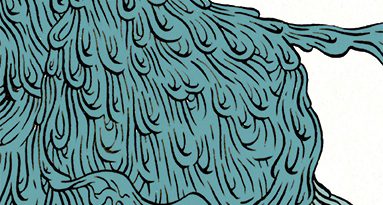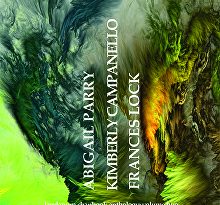Here birds are by Arthur Allen
– Reviewed by Becky Varley–Winter –
“Here birds are what?” you might ask, facing the cover of this debut pamphlet by Arthur Allen: a dark green, dusky sky with shadowy birds flying. Here birds are is an elegy for the poet’s father, Graham Allen, and its unanswered question conveys some of the mood of the work, which opens with an un-sent birthday card, “Half a conversation I expected I’d finish on a postcard of a bronze inkstand in the shape of a crab. […] You’d have laughed in the end.”
The birds here are not revelatory deliverers from grief. I feel endeared to the pamphlet immediately, because it catches the raw edges of mourning, its self-consciousness – as if you might, somehow, be doing it wrong. The poems are tender, at times distractingly beautiful, and shy away from overstatement. “He was found maculate / on his side, limbs like crushed cowslip flowers / tangled in the bicycle frame”, Allen writes. The word maculate echoes immaculate, but means its opposite: marked or stained. On knocking at his parents’ door in ‘Homecoming / Epithalamion’, he writes:
I feel as if I’m drumming on my own chest and hearing
the rattle of something impaired. Everything I feel
feels inauthentic or ill-formed. […]
Rather than a passing swoosh of wings, the birds in these poems feel damaged, as if they are being eaten, with difficulty. The mother is described lovingly, “a sob / breaking like a small bone in her throat”. In ‘The First Night’, Allen writes: “Morning: I dizzy the birds / and smash them into feathercake and catch / my breath with anger.” I wonder if this is meant to suggest the sixteenth-century amusement of putting live birds in a pie, to then fly out and escape. Allen also refers to augury, the practice of reading the future in birds’ entrails, as well as their movements across the sky. The father’s body becomes like a bird, “opened and pinned as a pair of wings”, prepared for cremation: “Fire flensed the intimate / random plan of his person, the world deferred and his jawbone / fell away like sugar.” If this is an augury, then it doesn’t work. The future is left completely unpredictable.
In ‘The Serenade’, quotations from books, marshalled as a kind of defence, also crumble away:
Nature cures
nature. Schopenhauer
and whatever Mark Twain said.
These useful quips are collecting
in my cold depths
like barracuda.[…]
What do they know anyway.
Barracuda are thin, silvery fish with fierce, grumpy faces. They’re not exactly reassuring, and there’s something funny about this image. Despite the sadness of its subject, Here birds are is strangely joyous to read. This is partly because it is so startling, animated by the natural world, without asking for any more transcendence than that world can impart (nature, as Allen recognises, will kill you as well as hold you). His use of imagery is whip-quick: “at the backdoor great blackberries of tears / start in my eyes.” Or: “I’m left holding sorrow like a monster / zucchini”. He gives space to absurdity, amid the fear that, in simply revealing pain, you might be showing it off, like some prize-winning vegetable. Not just searing visionary shock, but the weariness of writing through it:
I’m sick of writing and always coming to the same
blue grey feeling. Light rain. Partition.
Thoughts like animals led toward an altar.
Here birds are reminds me of Emily Berry’s Stranger, Baby, and, to some extent, Ocean Vuong’s Night Sky With Exit Wounds, though Allen’s style is his alone. He’s written both a heartfelt elegy and a really distinctive array of poems, full of continuously surprising attention, “preserved / in love.”





